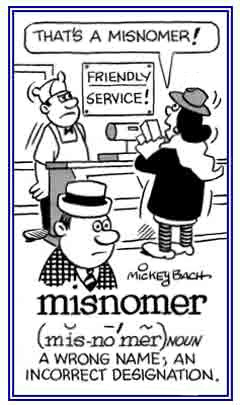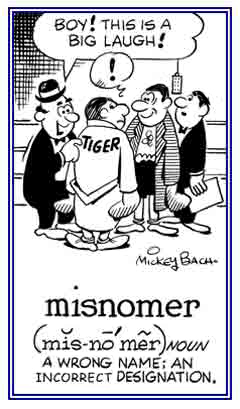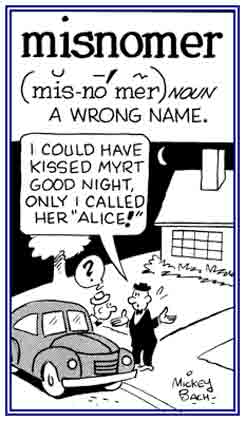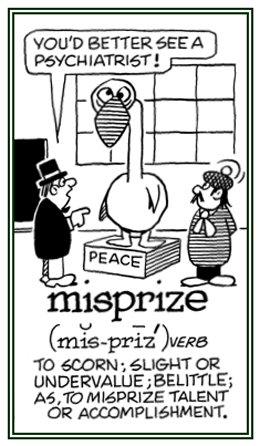mis-
(Anglo-Saxon: bad, harsh, wrong; always a prefix)
Don't confuse this mis- unit with the following units: misce-, "mix, mingle"; miso-, mis-, "hate, hatred"; miss-, -miss, -mis- "send, throw".
misdiagnose (verb), misdiagnoses; misdiagnosed; misdiagnosing
1. To make an incorrect diagnosis.
2. To diagnose erroneously.
2. To diagnose erroneously.
1. A wrong, incorrect, or mistaken identification of an illness: "Harm may result when a patient gets a misdiagnosis because he or she may get an incorrect therapeutic treatment."
2. A conclusion, identification, or decision reached by mistake: "Unless there is proper testing, the potential for a misdiagnosis can be considerable."
2. A conclusion, identification, or decision reached by mistake: "Unless there is proper testing, the potential for a misdiagnosis can be considerable."
"After several misdiagnoses, the committee found out what the problem actually was and then tehy were able to come up with a successful solution."
1. In law, the abuse of lawful authority in order to achieve a desired result.
2. An improper and unlawful execution of an act that in itself is lawful and proper.
2. An improper and unlawful execution of an act that in itself is lawful and proper.
1. An unnecessary and unforeseen trouble resulting from a bad event: It was a terrible misfortune when Brian's computer crashed just before he could save all of the contents he was working on.
2. A calamity; a mishap: Jason had the misfortune of having a flat tire just before he was about to set off on a cross-country trip.
2. A calamity; a mishap: Jason had the misfortune of having a flat tire just before he was about to set off on a cross-country trip.
1. An unfortunate accident or piece of bad luck.
2. A bad circumstance or set of circumstances.
3. An unpredictable outcome that is unfortunate.
2. A bad circumstance or set of circumstances.
3. An unpredictable outcome that is unfortunate.
A wrong or unsuitable name to describe something or someone: The term "International Airport" is considered to be a misnomer by some people in Jane's town, because almost all of the arriving and departing flights are usually local.

© ALL rights are reserved.

© ALL rights are reserved.

© ALL rights are reserved.
Go to this Word A Day Revisited Index
In the military services, the term "gun" is considered to be a misnomer for "rifle".



Go to this Word A Day Revisited Index
so you can see more Mickey Bach illustrations.
An error in the printed copy of a text resulting from a mistake made when the text was being printed.
misprint (verb), misprints; misprinted; misprinting
To make a printing error or mistake.
misprize (verb), misprizes; misprized; misprizing
1. To fail to appreciate the value of something; to undervalue: It was only after her longtime boyfriend left her that Sally realized how she had misprized their relationship.
2. To despise, to disparage, or to dislike something: The theater critic misprized the new play in his review in the newspaper, saying that the plot did not contain any suspense.

© ALL rights are reserved.
Go to this Word A Day Revisited Index
2. To despise, to disparage, or to dislike something: The theater critic misprized the new play in his review in the newspaper, saying that the plot did not contain any suspense.

Go to this Word A Day Revisited Index
so you can see more of Mickey Bach's cartoons.
misrender, (verb) misrenders; misrendered; misrendering
To translate or to recite incorrectly or improperly: "Ms. Smith accidentally misrendered the meaning of a key word in her translations for the medical dictionary and so she had to render a supplemental correction."
1. An error in action, calculation, opinion, or judgment caused by poor reasoning, carelessness, insufficient knowledge, etc.
2. A misunderstanding or misconception.
2. A misunderstanding or misconception.
mistake (verb), mistakes; mistook; mistaking
1. To regard or identify wrongly as something or someone else: "James mistook the man for his brother Arthur because they looked so much alike."
2. To understand, interpret, or evaluate wrongly; to misunderstand; to misinterpret.
2. To understand, interpret, or evaluate wrongly; to misunderstand; to misinterpret.
mistranscribe (verb), mistranscribes; mistranscribed; mistranscribing
Recording something in writing incorrectly.
mistreat, mistreats, mistreated, mistreating (verb forms)
To treat someone, or something, badly or roughly.
1. Suspicion about, or lack of confidence, in someone or something.
2. A doubt about someone's honesty.
2. A doubt about someone's honesty.
Inter-related cross references, directly or indirectly, involving word units meaning "bad, wrong": caco-, kako-; dys-; mal-; pessim-; sceler-.


